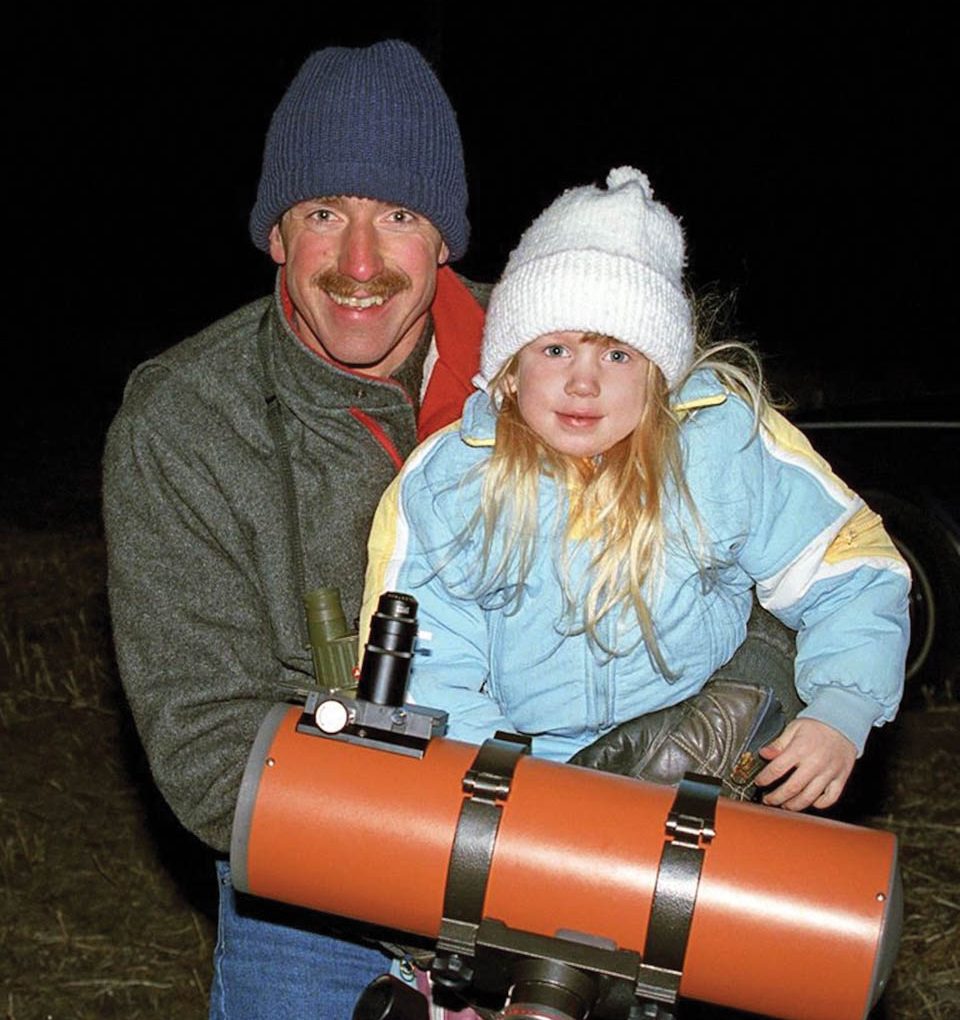
Britt Lundgren with her father in 1986
By Emma Castleberry
In the spring of 1986, Brad and Mel Lundgren woke up their two young children in the middle of the night. The couple had borrowed a small telescope from their family-owned camera store in Rockford, Illinois. Brad and Mel took their kids on a special late-night outing to view Halley’s Comet, which was visible from Earth for the first time since 1910. The Lundgrens’ daughter, Britt, learned an important lesson that night. “Afterwards we went for pancakes at a 24-hour diner, which really signaled to me that astronomy is a great adventure with good, late-night food,” she says. “And I think that’s when I got really hooked. I was a huge Star Trek fan, and becoming an astronaut was always a goal of mine. At some point, I realized that space might be more effectively explored using telescopes, so I decided to study astrophysics in college and graduate school.”
With a doctorate from the University of Illinois Urbana-Champaign, and a Bachelor of Arts from the University of Chicago, Britt Lundgren joined the UNC Asheville faculty in 2016 as an assistant professor of physics and astronomy. She was recently named a 2020 Cottrell Scholar, an honor that includes a $100,000 prize from the Research Corporation for Science Advancement (RCSA) in support of her research. “Galaxies like our own Milky Way, which contains hundreds of billions of stars, are surrounded by immense halos of diffuse and mostly invisible gas,” she says when asked to explain her research. This gas is very important because, under the right conditions, it can create new stars. By studying data from telescopes, Dr. Lundgren’s research aims to better understand “how galaxies evolve, grow and change over billions of years as a result of this gas consumption, expulsion and heating,” she says.
Dr. Lundgren’s project is far from being a solitary effort. One of her mentors at the University of Chicago, professor Donald York, inspired her to include undergraduates in her research. “Participating in real, cutting-edge astronomy research as a college student was exciting and confidence-building, and undeniably the best part of my undergraduate education,” she says. “Later in my career, as I was looking at different faculty positions, I actively sought out a place where I could provide a similar experience to a new generation of undergraduates, and UNC Asheville seemed like a great fit.” Dr. Lundgren’s team includes major contributions from both past and current students in physics, computer science and environmental studies, including Darren Stroupe, Nathan Kirse, Matthew Peek, Blake Hudson and Samantha Creech.

Britt Lundgren
The moment she stepped on campus at UNC Asheville, Creech knew she wanted to do research. Another astronomy professor introduced her to Dr. Lundgren, and the two explored how Creech could get involved. “Throughout that year, I’d stop by her office hours to get coding advice and talk about possible projects,” says Creech. “By the time I was a sophomore, my coding skills were proficient enough to start a project, and I’ve been working with her ever since.”
Creech says that researching with Dr. Lundgren has helped her grow as a student and a researcher. “I’ve learned how to work independently, gained programming skills and gotten a sure sense of where I want to go after I graduate,” she says. “Astronomy is an accessible, fascinating field that touches so many people, and Dr. Lundgren’s contagious enthusiasm really embodies that.”
As a freshman, Tiffany Shreves was in an introductory astronomy course taught by Dr. Lundgren. “It was her passion for the material that made me want to learn more about the universe,” says Shreves, who is a computer science major. “I loved that course so much that I declared an astronomy minor.”
Now a senior, Tiffany is working on Dr. Lundgren’s research as part of her computer science capstone project. “Dr. Lundgren taught me a lot about how important it is to think outside the box and about the value of interdisciplinary collaboration,” she says. “She mentors students from across majors and disciplines and creates opportunities for them to work together and learn from each other. Working with people with experience in different fields helps students support one another, ask unique questions and create projects that are interesting and fun to work on.”
Many of Dr. Lundgren’s students have already presented work at national conferences, had summer research internships at NASA and abroad and received offers from graduate schools and observatories. “It’s all incredibly exciting and rewarding to be a small part of their trajectories,” says Dr. Lundgren. “Working one-on-one with my research students at UNC Asheville is really the best part of my job.”
The Cottrell Scholar Award will provide her with resources for traveling to conferences and meeting with collaborators, as well as supporting her student team. “UNC Asheville has fantastic students who are capable of participating in these projects, and generally they need some financial support to do so,” says Dr. Lundgren. “I’m most excited that this award will give me added flexibility to provide some of that support when needed.”
Dr. Lundgren acknowledges that astronomy is a decidedly exciting field. In just the last five to ten years, the expansion of knowledge and technology relating to our place in space is astounding. But for her, the study of astronomy is an ever-present reminder of something else, too. “I think the greatest gift of modern cosmology is the notion of scale: that, relative to the universe, we are incredibly small, young and fragile,” she says. “I think anyone who ponders this in earnest will come away understanding how important it is that we all work together to preserve our planet.”
For more information about Lundgren and her research, visit Astrophysics.wp.unca.edu/Britt-Lundgren.






